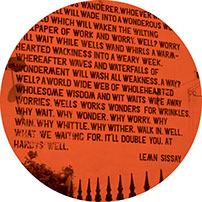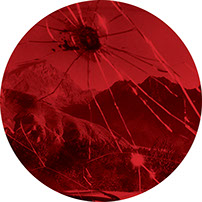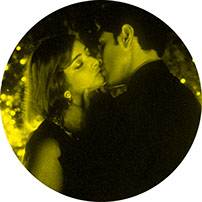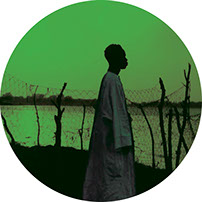N O T E S F R O M T H E S O U T H
 Writ Large
Writ Large
Peter spoke to Lemn Sissay, one of the UK’s most high-profile poets, when he was in Durban for Poetry Africa
Lemn Sissay is one of the UK’s most recognisable poetic voices. Both a poet and a high voltage performer, he has managed to extend his poetry into the public realm. The words of Lemn Sissay cover entire buildings and streets in Manchester. They have been recorded onto CD, (most famously on Leftfield’s Leftism album where Sissay’s 21 Century Poem’s takes central place) and emblazoned on a central London Bus Route. He has an extensive back catalogue of his collections of poetry (Including Rebel Without Applause and Tender Fingers In A Clenched Fist), a spoken word CD entitled Different Drums and has recently produced a book for children, The Emperor’s Watch Maker, as well as maintaining a regular presence on British television and radio. I spoke to this one-man media-empire about the endless challenge of taking his poetry to the public.
Peter Machen: I have read much about you, but nowhere does it detail how you came to establish such an extremely large footprint as a poet, a vocational post that is usually pretty obscure in our global culture. Would you mind telling me how a little about the process of how you shifted your poems to a more central position?
Lemn Sissay: In Letters To A Young Poet, Rainer Marie Rilke asks the question, and I paraphrase, “ask yourself ‘would I die were I not to write’ – if the answer is ’no’ then do not write”. If I have had made any footprint into culture in Britain it is because I just won’t go away.
Poetry is the voice in the back of the mind. We speak in inadequate sentences but we think in poetry. To translate this onto the page is the most challenging, exhilarating and scintillating process. Whether I am ‘good’ or not is determined poem-by-poem, by myself and my own developing critical judgement. However, any 'success' - and that is a quote not a statement - I attribute to the poem. I think of a poem as the King or Queen - I am just the dresser. They are the living beings.
But a central position? A central position in what? In me, as I have explained, poetry takes central position. Whereas in society poetry is marginalised. Marginalised because, when necessary, the poem, without excuse or respect for protocol, sheds light onto the darkest secrets that society holds dear. Society and its representatives will always fear this. However, if you are asking me how my poems have shifted into a more central position in popular culture, I can honestly say I don’t know.
PM: I don’t know if it still exists, but one of my favourite things about London was always Poems on the Underground. You have gone several steps further and managed to cover buildings and street with your words – which I have to say, makes me a little jealous. Was this always an ambition of yours? And how did you persuade people to give you such large canvases?

LS: I was asked to do a couple of buildings as commissions. I began to see a movement happening in that some of the poems have become landmarks. I began to encourage this by pointing out buildings that I was interested in working with. More commissions followed. I see myself as a poetic tattoo artist writing my words onto the skin of a tremendous city. A body of work.
PM: I’ve read that you had to extract royalties for your 21st Century Poem from Leftfield in court. How did the poem come to be on the album, and why do you think you had to resort to strong-arm tactics for what is rightfully yours?
LS: I was asked to write the lyrics. I shall always defend my rights as a writer. You can take my home, take my shoes and take my clothes. You can not take my work. My work is my soul. My work is my closest friend and, whether I am ‘popular’ or ‘successful’ or not, I will protect my work and my soul by all means and power, and as Samuel L Jackson quotes in pulp fiction, "I will strike down with great vengeance" on anyone who attempts to take it away.
PM: And while we’re on the subject, poems, by virtue of their brevity, are very hard things in which to enforce copyright and from which to earn an income. You work and have worked in several other capacities, as a performer, presenter etc. What percentage of your income do you think comes exclusively from your poetic output, and do you think it is possible for even the most gifted and recognised poet to live solely off his or her poetry. I realise of course that nobody ever writes poems for the money.
LS: Brevity? You mean the bigger something is the more difficult it is to rip off or defend. No. Poetry is the largest thing in my life and its copyright is a right. And there are international laws in place to uphold it.
Look – none of these other things, presenting recording etc, would be possible without poetry so one can not quantify financially what percentage of my income comes from poetry in comparison with my other works.
PM: Why do you think that so many people have such an automatic aversion to the very concept of poetry?
LS: It’s because it tells emotional and political truths. We have come to view poetry, wrongly in my opinion, as the confessional. How have we done this? We often resort to writing poetry at the most important times in our lives – births, deaths, marriages. Graveyards here in England are littered with poems as the final messages people leave with their loved ones. Poems are read at most marriages here. We open birthday cards to see the verse inside. We read valentines cards to see what another person thinks of us, through poetry. Point being is that we revert to poems to say what we often hadn’t had the guts to say in everyday life.
Politically poetry has always been the eye opener. I think of the poets of the sixties in Black America, the poets of Eastern Europe (some became presidents) and, of course, the poets of South Africa. But when it comes down to the overtly political nature of writing, I reserve the right to, as Steve Biko said, "write what I like".
PM: You are a poet and a performer. Although poetry and performing have always been bedfellows, not all poets are performers. Do you think that this is a cop-out? Do you think that there is a responsibility on poets to take their work to audiences in their own actual voice?
LS: I prefer the term spoken word. The best part of writing is the writing. When a poem is spoken the audience gets a percentage of the buzz that the poet gets. To be published is important. Books are flags in the mountainside that describe the poet's view at any particular point in their journey.
PM: You write about an urban context and – I think – you offer transcendence from within that context. Can you tell me a little about your spiritual beliefs?
LS: I don’t understand the word urban except that it rhymes with Durban. Let’s get urban in Durban. Spiritually, I believe in Love and with this comes the anger that will defend it and the passion to embrace it.
PM: Finally, you have a website (www.lemnsissay.com) but I could find only a few of your poems on the site. Is this to encourage people to buy your books? How do you view the internet as a platform on which to publish poetry? Do you think that paper-and-ink are important? And do you have any problems tracking the copyright of your work?
LS: I have no problem tracking copyright. My agents do that for me. Most of my books are out of print at the moment, which is kinda wild. The idea of ink caught in a straw and being poured on a piece of paper in strange marks that can make people laugh and cry is primal. It goes way back. Whether it is done on the internet or on paper it amounts to the same thing.

More
Writing
© 2017 Peter Machen. All rights reserved About Contact Peter Machen Web design: The Communication Factory


